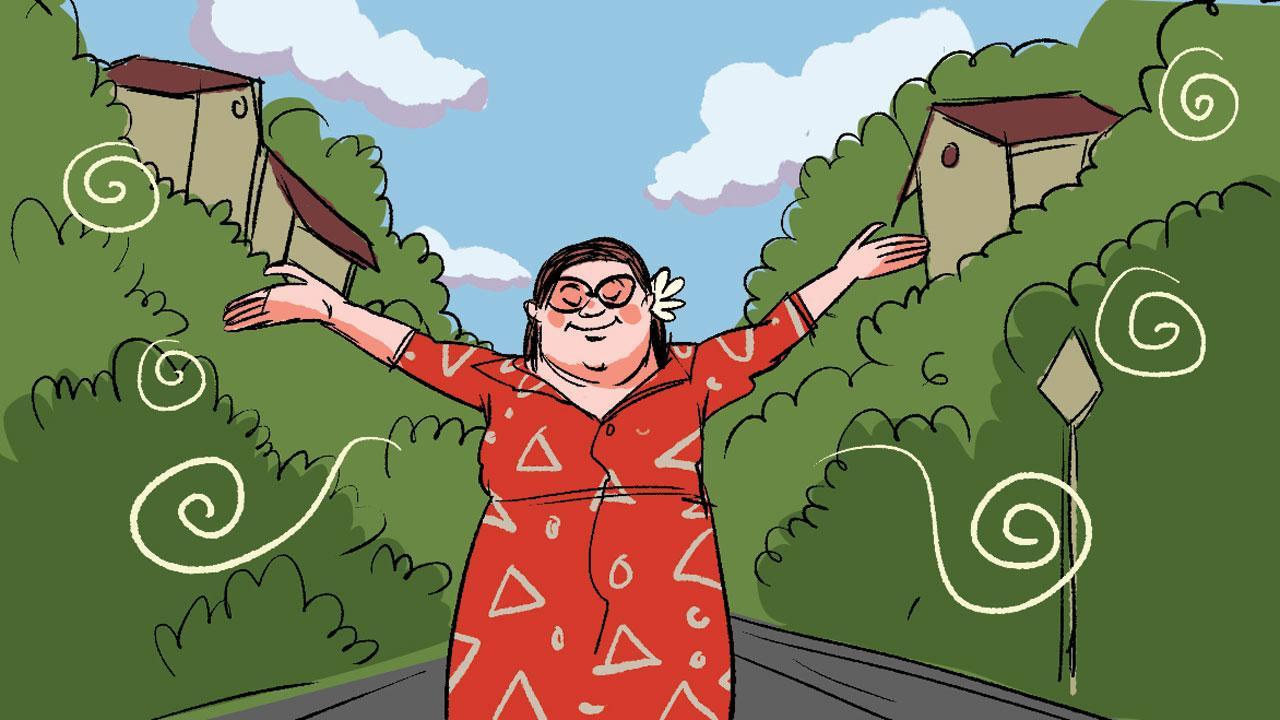That is correct, because the best things in life are free, mera matlab hai green.

Illustration/Uday Mohite
![]() I’ve spent the last few days in the middle of an expanse of green. Don’t get me wrong, it’s not a sylvan forest or pastoral paradise. It’s just a place not yet very developed, as they say. Desires of development are ever around us, however—walls, roads, gates, several barricades. I’m in the area’s sole tall building. From my room on the 7th floor I can see spread out around me, trees and the occasional red roof. As a city-dweller I feel a bit confused. I feel like I must immediately make use of this opportunity and go on several walks, take early morning deep breaths and allow the mists to swirl my brain into softness. Overwhelmed by the need to optimise, I become paralysed and have spent most of my time doom-scrolling, occasionally glancing out at the greenery from my window. Supermarket syndrome it’s called.
I’ve spent the last few days in the middle of an expanse of green. Don’t get me wrong, it’s not a sylvan forest or pastoral paradise. It’s just a place not yet very developed, as they say. Desires of development are ever around us, however—walls, roads, gates, several barricades. I’m in the area’s sole tall building. From my room on the 7th floor I can see spread out around me, trees and the occasional red roof. As a city-dweller I feel a bit confused. I feel like I must immediately make use of this opportunity and go on several walks, take early morning deep breaths and allow the mists to swirl my brain into softness. Overwhelmed by the need to optimise, I become paralysed and have spent most of my time doom-scrolling, occasionally glancing out at the greenery from my window. Supermarket syndrome it’s called.
ADVERTISEMENT
And why not supermarket syndrome? After all, greenery has become something to buy. The term greenery, one most often used for crafted greens of gardens, itself sounds like an element of set direction, a moveable piece. Our relationship with greenery is rocky. We have been trained to see it as exotic, found in the forests of Wayanad, or, atop the monsoon Konkan hillsides. Greenery is to be remarked on when encountered. Lying casually around as it is over here, it’s described from human point of view as “that far-flung, deserted place”. How to make it near from far? Build, construct, develop. It’s a compromise relationship of course, but aren’t relationships about compromise—by somebody? A suburb is so near, yet always so far, like so much else in our lives of connected dis-connection.
As Bombay people we felt disgruntled when Delhi people started murmuring about how winter was cuddling up to them—slowly in September, on-suddenly in October. Well, but anyway we said, with the customary cynicism of the jealous, in winter they will have fog. They will have poor AQI. We have pollution but we have the sea air na, we said smugly. Chalo, we have poor air too now. Dilli door nahin.
Our politicians have deserted us, running away with builders, we are told. I read about American citizens currently incessantly calling up their representatives demanding a ceasefire in Palestine and I wonder what it might be like if we could do that too. Do we even know the phone numbers of our representatives? If we did, would they answer our calls? We will have to try to know.
Also read: Mumbai: Traffic Police order inquiry into QR-gate
We have been trained not to expect greenery unless we are rich enough to buy it by countless advertisements in the paper for very expensive flats tiled with Italian marble, bearing names like Malibu Greens that are set in something called nature. Here you can “forget the world” because what’s it to you? Free air in a gated community (not to be confused with a refugee camp, which can be bombed) makes us feel secure. Poor air is for poor people, for everything else there’s air purifiers. You’re a good person, though. So, you take moderate breaths, both sides of your nostrils now.
Recently, I saw some Instagram posts saying there is too much strife in the world, let’s all post some pictures of nature for peace. That is correct, because the best things in life are free, mera matlab hai green.
Paromita Vohra is an award-winning Mumbai-based filmmaker, writer and curator working with fiction and non-fiction. Reach her at paromita.vohra@mid-day.com
 Subscribe today by clicking the link and stay updated with the latest news!" Click here!
Subscribe today by clicking the link and stay updated with the latest news!" Click here!







